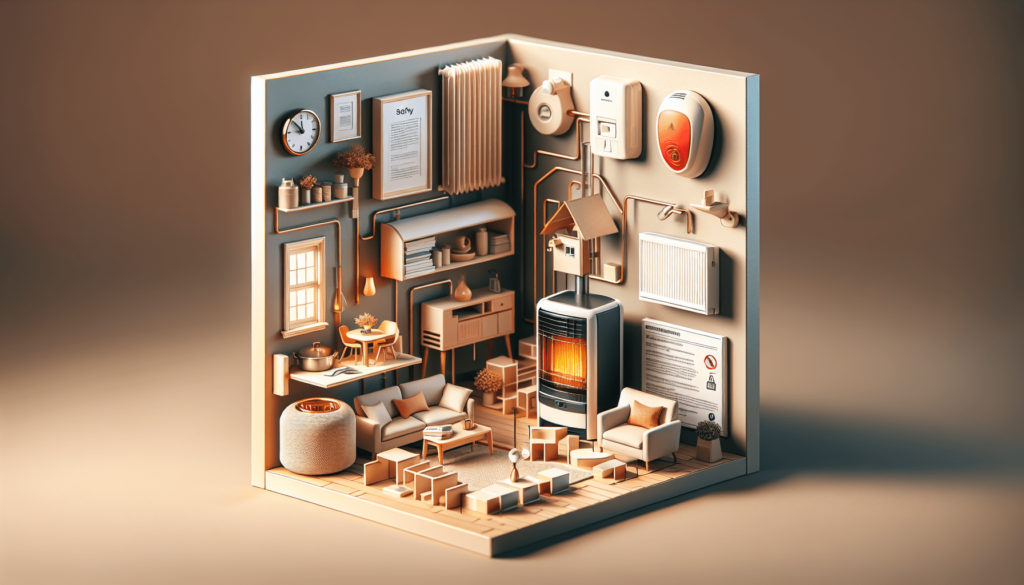
Have you ever wondered how you can ensure the safe operation of your oil heater? Using a device that generates heat in your home can sometimes feel intimidating, especially with safety concerns in mind. Let’s unravel the ins and outs of operating your oil heater safely, step by step, making this seemingly complex task approachable and worry-free.

Understanding Your Oil Heater
Before diving into safety protocols, it’s crucial to comprehend how your oil heater functions. Knowing the basic components and operations can make a world of difference.
How Does an Oil Heater Work?
An oil heater converts oil into heat through a combustion process. The oil, stored in a tank, is pumped into a combustion chamber where it is mixed with air and ignited. This process produces heat, which is then distributed through your home via a system of ducts or radiators. Understanding this basic operation helps you better appreciate why maintenance and proper operation are vital for safety.
Types of Oil Heaters
Not all oil heaters are created equal. Here’s a simple table to help you distinguish between common types:
| Type | Description | Usage |
|---|---|---|
| Conventional Oil Heater | Uses an oil tank to store fuel, requires regular refilling. | Ideal for homes or areas without natural gas availability. |
| Portable Oil Heater | Small, movable units that use kerosene or diesel. | Suitable for temporary heating solutions or small spaces. |
| Oil-Filled Radiator | Sealed units filled with oil that is electrically heated. | Best for quiet, consistent heat in smaller rooms or offices. |
Knowing the type of oil heater you own or plan to purchase can help you follow the best safety practices specifically tailored to your heating device.
Installation Safety
Safety begins right from the installation stage. Ensuring that your oil heater is correctly installed sets the groundwork for worry-free operations.
Professional Installation
Whenever possible, have a professional handle the installation of your oil heater. They are trained to follow safety regulations and can ensure your heater is up to code.
Proper Ventilation
Oil heaters require adequate ventilation to operate safely. Proper ventilation prevents the buildup of dangerous gases like carbon monoxide. Ensure vents and chimneys are clean and free from obstructions.
Safe Placement
Place your oil heater on a non-combustible surface, away from flammable materials. Keep a minimum clearance of three feet around the heater to prevent accidental fires.
Operating Your Oil Heater
Once your heater is correctly installed, understanding and following the best operation practices is essential.
Starting Up
Before turning on your heater, check for any leaks or unusual smells. It’s wise to conduct a visual inspection to ensure everything looks in place. Start the heater according to the manufacturer’s instructions.
Temperature Settings
Maintain appropriate temperature settings to avoid overheating. Overheating can strain the system and increase the risk of malfunction or fire. It’s recommended to keep the thermostat at a comfortable yet safe level, typically around 68-72°F (20-22°C).
Regular Monitoring
Regularly monitor your heater while it’s in operation. This involves periodically checking the fuel levels, looking out for any unusual noises or smells, and ensuring the heater is functioning smoothly.
Maintenance: A Key to Safety
Regular maintenance is crucial for the safe operation of your oil heater. Scheduled check-ups can prevent minor issues from becoming major problems.
Annual Servicing
Have your oil heater serviced at least once a year by a professional. They can clean components, check for wear and tear, and replace any parts if necessary.
Filter Changes
Dirty filters reduce efficiency and can cause overheating. Change your filters regularly as recommended by the heater’s manufacturer.
Inspecting Fuel Lines
Ensure there are no cracks or leaks in the fuel lines. If you suspect a leak, immediately shut off the heater and contact a professional.
Safety Precautions
Adopting safety precautions can significantly reduce the risk of accidents and ensure your heater runs smoothly.
Smoke and Carbon Monoxide Detectors
Install smoke and carbon monoxide detectors near your heater. Regularly test these detectors to ensure they are functioning properly.
Fire Extinguisher
Keep a fire extinguisher near your oil heater and make sure it’s in good working condition. Knowing how to use it can be crucial in an emergency.
Keeping Children and Pets Safe
Oil heaters can be hot to touch and pose a risk to children and pets. Educate your family members about the dangers and establish a safe zone around the heater.

Emergency Protocols
Even with all precautions, it’s essential to be prepared for emergencies.
Recognizing Problems
Know the signs of a malfunctioning heater. This can include unusual noises, persistent odors, or inconsistent heating.
What to Do in Case of a Leak
If you detect a fuel leak, shut off the heater and the fuel supply immediately. Ventilate the area and contact a professional for assistance.
In Case of Fire
If a fire occurs, evacuate everyone from the area and call emergency services. Use your fire extinguisher only if it’s safe to do so.
Understanding Fuel Safety
The type of fuel you use impacts the operational safety of your oil heater.
Storing Fuel
Store fuel in a well-ventilated, secure area away from any heat sources or open flames. Ensure that the containers are labeled and kept upright to prevent leaks.
Handling Fuel
When refilling your oil heater, avoid spills and handle the fuel carefully. Wear gloves and clean any spills immediately to prevent accidents.
Choosing the Right Fuel
Use only the fuel type specified by the manufacturer. Using the wrong fuel can damage the heater and void warranties.
Environmental Considerations
Operating your oil heater safely also includes being mindful of environmental factors.
Efficient Use
Optimize your heater’s efficiency by reducing drafts in your home and ensuring the heating system is properly insulated.
Disposing of Used Oil
Dispose of used oil responsibly by taking it to a recycling center. Never pour it down the drain or onto the ground.
Reducing Emissions
Opt for low-sulfur oil to reduce emissions and lower your heater’s impact on the environment.
Troubleshooting Common Issues
Minor issues can often be resolved without professional help. Here’s a quick guide:
| Issue | Possible Cause | Solution |
|---|---|---|
| Heater not starting | Lack of fuel, blocked filter, or power issue | Check fuel level, replace filter, and ensure power. |
| Unusual noises | Air in the lines, worn-out parts | Bleed the lines, or contact a professional for parts. |
| Poor heating performance | Dirty heater or faulty thermostat | Clean the heater, check and replace the thermostat. |
| Persistent smell of oil | Leaks or incomplete combustion | Inspect for leaks, ventilate area, call a technician. |
Understanding these common issues and their solutions can save you time and prevent potential hazards.
The Role of Technology in Safety
Advancements in technology can significantly enhance the safety of your oil heater.
Smart Thermostats
Smart thermostats can help maintain optimal temperatures and notify you of any irregularities, ensuring efficient and safe operation.
Safety Sensors
Modern oil heaters often come equipped with safety sensors that automatically shut down the heater if a problem is detected.
Remote Monitoring
Some heaters allow for remote monitoring via apps, giving you real-time updates and control over your heating system, even when you’re away.
Common Myths About Oil Heaters
There are many misconceptions about oil heaters. Let’s debunk some of the common myths.
Myth: Oil Heaters Are Less Safe Than Electric Heaters
While oil heaters do have specific safety concerns, they are not inherently less safe than electric heaters. Both types require regular maintenance and proper use to ensure safety.
Myth: You Can Use Any Oil in Your Heater
Using the incorrect type of oil can be dangerous and damage your heater. Always use the fuel recommended by the manufacturer.
Myth: Maintenance Is Not Necessary
Regular maintenance is crucial to keep your oil heater operating safely and efficiently. Neglecting maintenance can lead to issues and potential hazards.
Choosing the Right Oil Heater for Your Home
Selecting the appropriate oil heater for your needs is the first step towards safe operation.
Factors to Consider
- Size of the Area: Ensure the heater is suitable for the space you need to heat.
- Fuel Availability: Check the availability and cost of fuel in your area.
- Safety Features: Look for heaters with built-in safety features like automatic shut-off and overheat protection.
Brand Recommendations
Researching reliable brands can also help ensure you are purchasing a quality product. Here are a few well-known brands:
| Brand | Known For |
|---|---|
| Toyotomi | Efficiency and advanced safety features |
| DeLonghi | Quality oil-filled radiators |
| Honeywell | Reliable portable oil heaters |
Conclusion
Operating your oil heater safely doesn’t have to be daunting. By understanding how your heater works, ensuring proper installation, regular maintenance, and adhering to safety practices, you can enjoy a warm and comfortable environment without the stress. Remember, safety is a continuous process that requires vigilance and care. Equip yourself with knowledge and take proactive steps to protect your home and loved ones.
